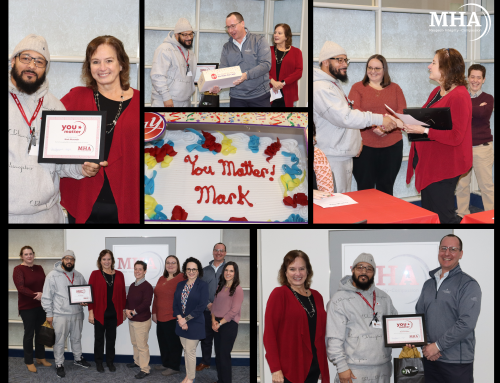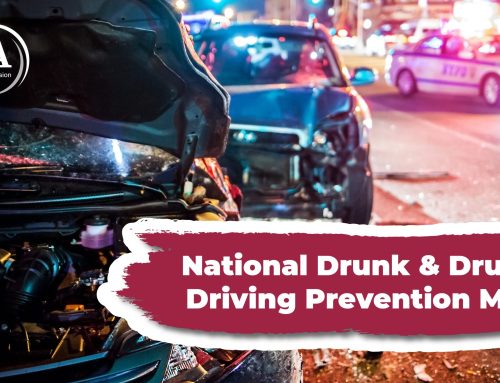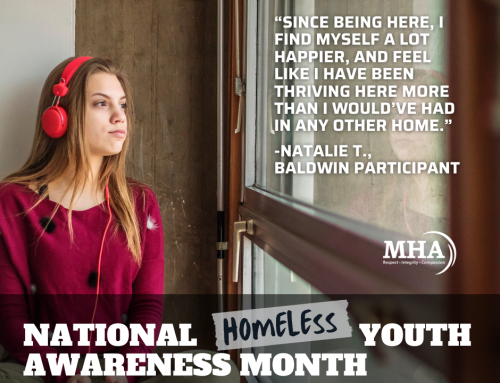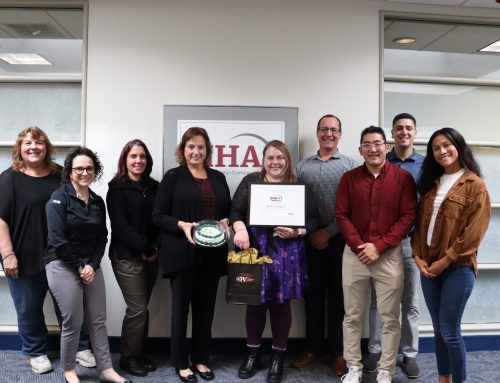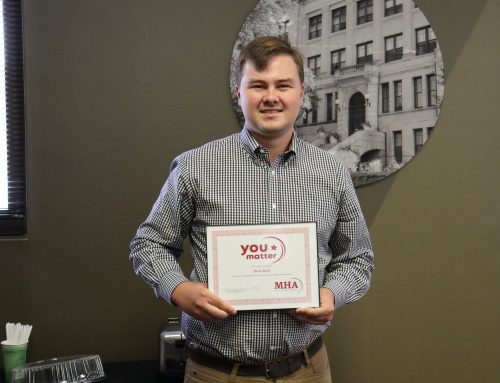
MHA staffer Jose Rivas, who turned 48 in April, is more than five years in recovery from the disease of addiction that started before his teenage years and brought the kind of behavior that took him straight to jail. It was during his last incarceration that he realized with profound certainty that this repeated outcome from “getting high” would continue indefinitely unless he committed indefinitely to managing his addiction.
“I remember thinking if I can’t stop here, I can’t stop at all,” Jose recalled. “I told myself I am done with it, I am ready to move forward and from that day – Dec. 20, 2016 – I have never had another substance in me.”
Jose’s story of a long-in-coming commitment to better decisions is one he now shares as program supervisor of MHA’s GRIT-Wilbraham residential rehabilitation program for adult men in recovery with co-occurring mental health and substance use disorders.
“A lot of questions the men ask are about what I went through in my recovery process,” Jose said. “They want to know if I went through what they are going through. The more I tell them about my story and how I got through it, the more they understand and respect the process and the work I continue to do.”
Jose entered a recovery program outside Hampden County to maintain his sobriety rather than returning home after his 2018 prison release. He told family members of his commitment to “staying clean” and that “if they really loved me and they were still in the streets to not give me a call.” He enrolled in a course offered at Westfield State University and became certified as an Addiction Recovery Coach to help “others know their triggers and get off drugs.” The certification requires training in mentoring and wellness support as well as in mental health, addiction and cultural competency.
Studies increasingly show that individuals, including adolescents, with substance use disorders often have co-occurring mental illnesses, something Jose said that those with addictions are often unaware of and that go untreated.
“I stress to the men that there are different people for different help,” Jose said. “A therapist helps with mental health, a sponsor with steps to stay sober and a recovery coach to find a pathway there. I wish I understood that a long time ago. I didn’t know about recovery coaches; I didn’t know my mental health is part of my addiction.”
The Springfield native said getting certified as a recovery coach has helped him maintain his own sobriety and that going through the process of recovery taught him the value of the different supports offered. He is grateful that MHA hired him in 2020, first as a care coordinator, next as a recovery coach and then to his current position as program supervisor.
“My passion is to help others in the same areas that I needed help in,” Jose said. “MHA gave me the chance to do that. I wouldn’t be here today if they had turned me away. I enjoy coming into work every day and helping the men with their recovery helps me stay sober. I love the work that we do here.”
He added working with the program’s resident can make for a “hectic” day.
“I greet everyone with a fist-bump when I arrive in the morning and that draws a laugh,” Jose said. “Our typical day can get hectic – 15 guys with 15 different personalities – but members and staff get along and talk about what is going on in the house. The culture is one where it is understood what everyone is going through. Empathy is a big part of it and helps me connect to residents and them to me.”
Jose said he talks with the men at GRIT about how recovery has bettered his family life, too. He has a son, 25, and two daughters, one 29, and the other 2.
“My life is blessed right now,” Jose said. “My recovery has given me another chance of being a father to my youngest and to go through the process the right way instead of being in my addiction. My older children contact me. They know what I have been through, and they know what I am going through. They see the change in me and they embrace it and it has been an awesome ride so far. I don’t want to go back.”
He added he tells the men in the program to “use me as an inspiration if that is what it takes.”
“I came from where you guys are sitting and if I can make it, you can make it,” Jose said. “That is a big part of my story to them. If I can do it, you can do it.”
To read more about MHA’s GRIT program, please visit www.mhainc.org/GRIT

